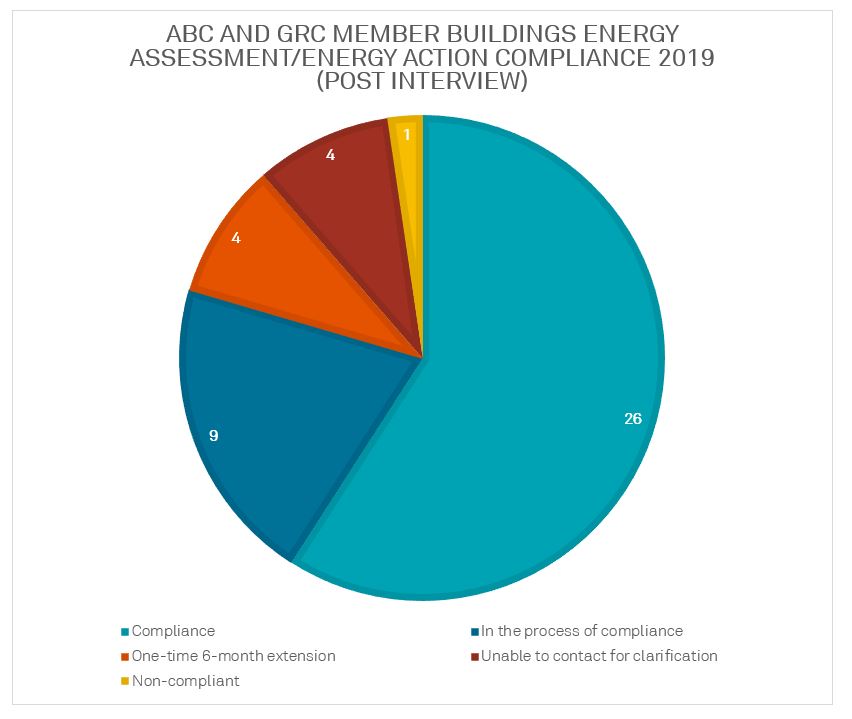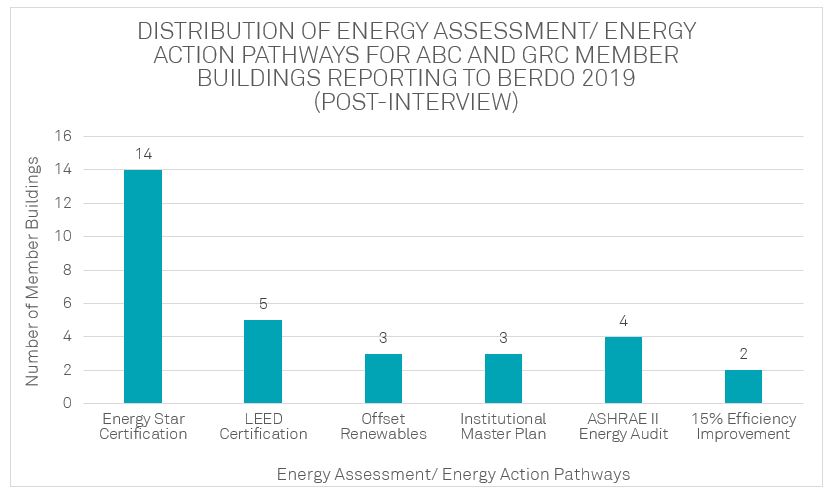Berdo Energy Assessment Compliance Findings - September 2020
September 10, 2020
WRITTEN BY YVE TORRIE, DIRECTOR OF CLIMATE, ENERGY & RESILIENCE & MARIA MASOOD, Intern
Based on the City of Boston’s 2019 Climate Action Plan update, in 2020 the City of Boston committed to a Building Emission Performance Standard aimed at putting existing buildings on a trajectory to zero net carbon by 2050. The City of Boston is interested in integrating this standard with its current Building Energy Reporting and Disclosure Ordinance (BERDO) program.
BERDO was enacted in 2013, requiring large buildings to report their annual energy and water use to the City. The goal of BERDO is to reduce energy use or greenhouse gas emissions over time within Boston’s large and medium-sized buildings. It consists of reporting and disclosing annual energy and water use for buildings over 35,000 square feet, and an energy assessment or major energy savings action every five years. To comply with the five-year requirement, buildings must demonstrate that they are highly efficient, have achieved significant reductions in carbon emissions, or have performed an energy audit:
- Highly Efficient Buildings can demonstrate their high efficiency in several ways:
- EPA Energy Star Certification buildings must have earned this certification for 3 or more of the previous 5 years;
- LEED Silver Certification buildings must have 15 points in Energy and Atmosphere; and
- Zero-net Energy, Zero-net Carbon, and E+ buildings must generate or purchase an amount of renewable energy equal to or greater than its consumption in the course of a year.
- Energy Action Buildings must have a minimum reduction of at least 15 percent over the last five years of a building’s:
- Total site energy consumption;
- Site energy use intensity;
- Total greenhouse gas emissions, excluding changes to the electricity grid;
- Greenhouse gas intensity, excluding changes to the electricity grid; or
- A 15-point increase in Energy Star score over five years.
- Energy Assessment Buildings that comply through the assessment pathway must have performed an energy audit during the 5 years prior to the due date. Buildings greater than 50,000 square feet must complete an ASHRAE Level 2 Audit. Buildings under 50,000 square feet may seek an ASHRAE Level 1 or equivalent audit to fulfill this requirement1.
A Better City performed an analysis of the BERDO data specific to A Better City (ABC) and Green Ribbon Commission (GRC) member buildings to understand the effectiveness of BERDO’s energy assessment or major energy-saving action every five years.
A BETTER CITY AND GREEN RIBBON COMMISSION MEMBER FINDINGS
We reviewed the portfolios of ABC and GRC building owners with buildings located in Boston that are 35,000 square feet and above that are required to report to BERDO. Based on the City’s latest public data release of October 2019, at the end of July 2020, we released the following preliminary findings:
- 75 member buildings were required to report to BERDO; 1 building reported voluntarily;
- 31 member buildings were not required to complete their energy assessment as they had not been reporting for 5 years; and
- 44 member buildings were required to conduct an energy assessment/energy action after 5 years of reporting. Of those, 22 complied, 19 were non-compliant, and 3 were given a one-time 6-month extension.
Since this analysis was completed, we have had the opportunity to interview representatives from nine ABC/GRC member buildings, representing 15 of the 19 ABC/GRC member buildings not in compliance with the energy assessment/energy action requirement of BERDO, to understand the challenges they have faced with complying. As a result of these interviews, we are happy to report that the non-compliance rates have changed significantly. Of the 19 buildings represented in the interviews we conducted:
- 4 buildings had already complied;
- 9 buildings are in the process of compliance;
- 1 building was given a one-time 6-month extension;
- 1 building was non-compliant; and
- We were unable to contact the remaining 4 buildings.
This significantly changed the results of the total 44 member buildings that were required to report an energy assessment/energy action in 2019:
- Buildings in compliance increased from 22 to 26;
- Buildings in the process of compliance were 9;
- Buildings that were given a one-time 6-month extension increased from 3 to 4;
- We were unable to contact 4 buildings; and
- One building was non-compliant.
For members that completed their energy assessment/energy action, the compliance pathways used were also updated. These pathways reflect both those who have complied (26) and those that are in the process of complying (9):
- 15 member buildings maintained ENERGY STAR for three or more-years (buildings with an energy star score of 75 or higher can apply to be ENERGY STAR-certified by the Environmental Protection Agency);
- 5 member buildings were Certified LEED Silver with at least 15 points in Energy and Atmosphere;
- 5 member buildings conducted an ASHRAE II Energy Audit;
- 5 member buildings used an Institutional Master Plan (they were a part of an institutional master plan that lowered emissions 15% or more portfolio-wide over the preceding 5 years);
- 3 member buildings reported the annual electricity generated by on-site renewables (buildings that have on-site solar panels or wind turbines can report the amount of electricity generated annually); and
- 2 member buildings used energy efficiency to lower their emissions onsite by 15% or more over the preceding 5 years.
CHALLENGES WITH REPORTING ENERGY ASSESSMENT/ENERGY ACTION DATA TO COMPLY WITH BERDO’S 5-YEAR REPORTING REQUIREMENT
We found that 80% of ABC and GRC buildings are now either in compliance or in the process of complying with the five-year energy assessment reporting, instead of 43% from the previous findings. Our interviews helped clarify the primary reasons for this discrepancy:
- Outdated data. The last publicly available dataset from the City of Boston is from October 2019. Some changes in compliance status were made after October 2019.
- Inadequate communication regarding energy assessment/energy action reporting requirements. The most common reasons we heard from interviewees was that: 1) they were not aware of the additional reporting requirement for the energy assessment/energy action; 2) they had not received communications about it; 3) they had put Energy Star or LEED data into their annual reporting and didn’t realize this didn’t translate into the energy assessment/energy action report; and 4) in a couple of cases, consultants who reported data on behalf of a member building were either unaware of the energy action reporting, or it wasn’t written in their contract.
- Members recommended that the City of Boston send paperwork regarding BERDO annual reporting and five-year energy assessment compliance reporting directly to the office (paper mail and e-mail) as staff changes mean that communications are not always received.
- Changes in the ENERGY STAR Portfolio Manager platform. In August 2018, EPA updated the performance metrics for U.S. buildings in ENERGY STAR Portfolio Manager. Some of our members reported that this had a significant impact in the scoring of some of their buildings, meaning that they were no longer ENERGY STAR-certified. One of our members with buildings nationwide said that 50% of their portfolio was no longer able to receive ENERGY STAR certification under the new scoring.
- Changes in the LEED Certification process. New projects registering for LEED certification after October 31, 2016, were required to use LEED V4 (as opposed to V3 previously). Members reported that this resulted in some changes to the LEED Energy and Atmosphere section’s allocation of points, which had an impact on their LEED score.
- Confusion regarding compliance routes for single tenant buildings. One of the members interviewed has a building occupied by a single tenant that has both the energy data and operational control of the building. The contract with the tenant was signed prior to the implementation of BERDO. This raises important questions around leasing contracts in the future and how to account for energy assessment compliance.
- COVID-19. Although the energy and water use data during the pandemic will not be reported until next year, many members warned there would be an increase in building energy use. They have made changes during the pandemic such as significantly increasing the amount of outside air (and reducing the amount of air that can be recirculated) and increasing the heaviness of the filtration, both of which require an increase in energy use. Although occupation rates have been significantly reduced, these changes are still necessary for the occupants that are on site.
- As a result of COVID 19, members also warned of the potential of stagnant water in the building pipes with a decrease in use, which can result in diseases like legionnaires disease.
SOURCES






